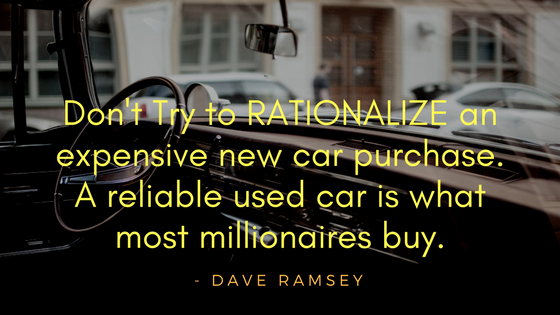Credit Wise – Using Credit Well Part 2 – Vehicle Loans
Having some form of transportation in today’s society is a need we all share. Personal vehicles provide freedom for us to get to the places we need or want to be. Although there are multiple forms of either manual or public transportation, a vehicle is going to be the main choice nearly every time.
Here’s the problem. We all want to have this freedom, but this freedom comes at a cost. The cost of buying a car, paying for insurance, and paying for other maintenance associated with owning a car; the largest cost being the initial purchase. Many other finance gurus may advise against getting financing for a car, and they are right. Ideally, it would be best to have all cash to purchase a car free and clear. This is an ideal scenario though, and we don’t always live in an ideal environment. In these cases, car loans will have to be acceptable for our needs to be met. However, I didn’t say you can’t be smart about it…
Most finance gurus will advise against vehicle financing, both for loans and leases. They are right – in a perfect world, we all could pay cash and purchase the car free and clear. This is an ideal scenario though, and life happens. Sometimes, it is necessary to get a car loan. However, I didn’t say you can’t be smart about it…
Adding another level of debt is not something to take lightly. I have been there multiple times. You have picked out the car you want to get (need to get). All of the criteria has been met for you to be approved for a new car loan, so you are sitting at a desk about to sign papers. You worry you might miss something if you do not read each and every detail of the documents, however, over half of the stuff you may or may not understand. So you sign on the dotted line. Congratulations! You now have a $30,000 car loan at 2.99% for $456/month for 72 months! Awesome right?

Now, it may not happen right away, but you will have the sickly feeling of buyer’s remorse. It happens to all of us, it is okay, you will be fine. If you are like me, you will begin reviewing your loan documents again to make sure you weren’t swindled. Being in the finance industry, it is just what I do. Even though I have read through every word in the documents, I am still feeling sick. What else could I have done to make this transition and hit to my finances less painful?
Obviously, this experience was seen in some of my early car buying experiences. Now I have an easy way to make sure I get what I want. I am not cheated, and I won’t feel sick after. How? A budget!
If you haven’t figured it out yet, your budget is central to all of your financial decisions. If you still have not created one, DO IT! It will help you. With your working budget, you will be able to quickly see how much extra income you have a month.
Now, let’s get down to the nitty gritty. As I said before, in a perfect world, we would all purchase vehicles with cash, owning them free and clear. But, we don’t live in that world. Not yet anyway. If you are struggling, especially with a vehicle, it may be the right decision for you to purchase with a loan. What are some valid reasons for needing a new car?
- High repair costs
- Family changes – growing, need a bigger vehicle
- Broken down vehicle
- Changing circumstances: IE. a longer commute, need to replace a truck with a fuel efficient car, etc/
These are all valid reasons for purchasing a new to you car, and if you don’t have the cash completely, it is acceptable to get a loan. But here is the catch. DON’T buy a brand new vehicle. DON’T finance for more than 60 months. More than that will put you into a “negative equity cycle” meaning that you will owe more than the car is worth. You will end up continuously stuck in a cycle of buying cars, on credit, never truly financially free. Instead, break the cycle. Buy less car than you can afford (IE: USED), and pay it off as quickly as possible. Give yourself POSITIVE equity (owe NOTHING and have the full value of the car), then continue to save for your next vehicle, breaking the cycle of financing.
One thing to keep in mind when you are shopping for cars is how they pull your credit report. When they run your credit to see if you qualify, they will do a “shotgun pull” meaning that they will pull your reports from approximately 10 different sites. This means 10 soft hits on your credit. So, don’t submit the loan application until you are ready. And don’t shop around for the best rate by pulling credit at every dealership. Do your research first, then make your application.

Loans can cause stress on a budget and on the owner’s mental state. Remember though, you did not purchase a car on a whim. You also thought it through to ensure you could afford everything. This is what differentiates a car loan being a debt issue to being a debt tool. Sure they are both valued the same. However, using debt as a tool to purchase something you need or can afford to want, puts you in a better position. With your budget, you have a plan already in place of where the money is going to come from to pay for it. In some cases, you will have extra money ready to pay towards it. There is no headache of uncertainty or stress about making a payment because “You couldn’t resist.”
Again, ideally, it is best to save cash to purchase cars. However, many of us do not have that luxury YET. One day your budget and hard work will pay off. You will have no debt, and you WILL be able to save cash for things to buy. Until that glorious day, remember to be smart about loans. They can be terrible for you when not used correctly. They are a tool meant to be used for support, but not indefinitely.

